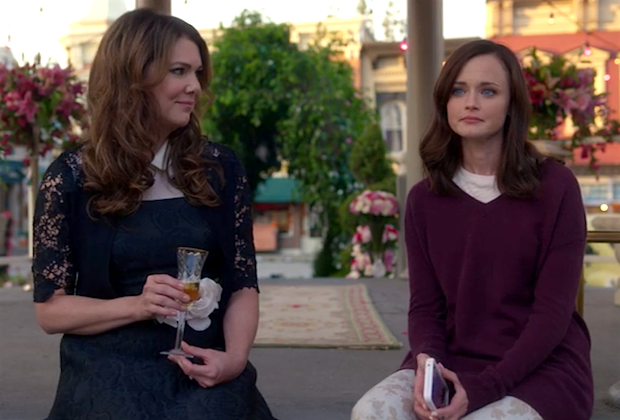Literary References of Gilmore Girls: A Year in the Life: Spring
Like most of you, we've been marathoning episodes of Gilmore Girls: A Year in the Life. After nearly a decade away from Rory Gilmore and her voracious reading habits, we were eager to catch up with the residents of Stars Hollow and the books they’ve been devouring.
Mild spoilers ahead! Haven’t finished the series? Head over to Luke’s Diner and stream the rest of the show. We hear he’s giving out his wifi password now.
Spring
First Folio by William Shakespeare
Rory Gilmore’s new on again, off again boss Naomi Shropshire opens a martini filled meeting with Rory by lamenting about the weather and its affects on her skin. “Come April my face is like one of Shakespeare’s First Folios,” Naomi exclaims, referring to the colloquial title of the 1623 published collection of William Shakespeare’s comedies, histories, and tragedies. At almost 400 years old, we can only imagine Naomi’s referring to the pages’ delicate nature. One touch with an ungloved hand has the potential to dissolve hundreds of years of history.
Death of a Salesman by Arthur Miller
“And try convincing her Willy Loman is not one of the characters in Aeschylus. That was a hoot,” Rory sighs over lunch with Logan Huntzberger. Turns out her new boss Naomi can really talk – and loves to mix her literary references while she’s at it. Willy Loman is actually a character from Death of a Salesman, Arthur Miller’s tragic play about loss of identity and man’s inability to accept progress in the ever-changing world of 1940s America. So while he’s not a character created by the ancient Greek tragedian, there’s no doubt Miller was influenced by Aeschylus.
The Art of War by Sun Tzu
Paris Geller, one woman machine, referenced Sun Tzu’s The Art of War during an alumni lecture to Chilton Academy students. “It’s kill or be killed,” Paris says, stating that war strategy is a walk in the park compared to what these students are about to face in the real world. While her tone is incredibly frightening to the teenagers she’s addressing, we can tell that she’s being 100% sincere. We missed you, Paris.
The Portable Dorothy Parker
Doyle and Paris are going through a nasty divorce perpetuated, seemingly, by Doyle’s flourishing screenwriting career. When we first see their shared home, Paris becomes fixated on the state of their stairs. Because the building is historic, Doyle refuses to install an elevator – even though the stairs constantly stand between them and their two children. Paris’ mimicry of her soon-to-be ex-husband sent us into cackles. “‘It’s prewar. Pre-Civil War.’ Like that wouldn’t make Dorothy Parker barf.”
Consider the Lobster by David Foster Wallace
When Rory gets her long-awaited meeting with Conde Nast, it’s a sit down with the editors of GQ. After tossing around praise and credits, one of the editors pitches Rory a story on lines in New York City. They’re everywhere, they claim, but they haven’t quite figured out what the angle on a story like that might be. “David Wallace would have nailed it,” he says, “but so far we haven’t.”






